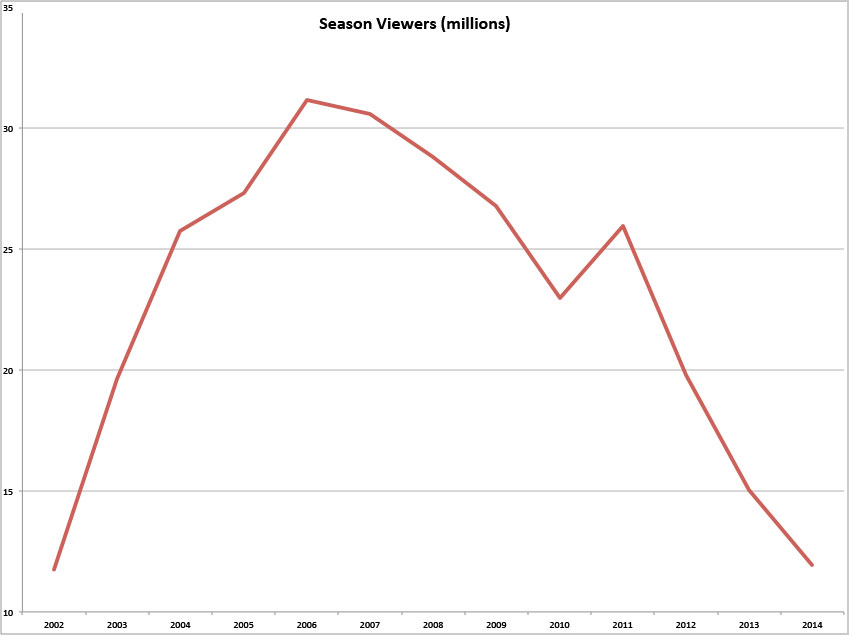This morning, Fox voted American Idol off the air.
After 15 seasons, the long-running franchise will come to a close at the end of 2016, and many are asking why Fox would kill a cash cow.
Despite having recently surrendered its talent-show supremacy to NBC’s fresher The Voice, American Idol is still very much a ratings pull in the diminishing returns of modern network television. It routinely draws more than 10 million viewers an episode and finishes within the top 20 episodes in any given week. So why is it getting the ax?
For starters, some of it is just a matter of freshness. Debuting in 2002, in an entirely different media landscape, the show is now well into its teens, having turned over casts multiple times. A quick glance at the ratings reveals a show that peaked in the mid-2000s and has been in sharp decline (ratings-wise) for the last two or three seasons.

There is no doubt the show was instrumental in changing the landscape of American entertainment, but the show is also a victim of the very changes it helped usher in — both in the music and the television industries.
Related: Here’s How Americans Listened to Music in 2014
Based on a successful British series, the show debuted in the summer of 2002 when the entertainment landscape was already shifting. The second half of the '90s had seen a shift from the temperamental singer-songwriter model of music to the much more controllable era of the manufactured band. Camera-ready singers and “bands” were rolled out while songwriters and engineers labored behind the scenes to craft perfect pop for commodities like Britney, ‘N Sync and The Spice Girls. It was the age of producer as auteur.
Television itself was in the midst of a change as well. In the summer of 2000, an experimental series called Survivor had become a giant ratings hit, which set off two large-scale changes. The first and most obvious was the dawn of the reality TV era. The second was the destruction of the traditional television season in favor of a more free-form style of scheduling. In the old system, shows started in the fall, ended in May and coasted on reruns through the summer. Survivor proved that people did watch TV in the summer, and American Idol doubled down on that, becoming the television event of the summer for several consecutive years.
It is also worth noting the national mood at the time. Less than a year after 9/11, our military involvement in the Middle East was picking up steam, and the bursting of the tech bubble had left our economy in shambles. Both situations would get worse as the show ran on, and in the same way that Great Depression era audiences turned to the comforting fantasies of Shirley Temple, the soothing balm of American Idol was what the nation wanted, if not needed.
Related: Startling Proof that the Music Industry is Doomed
The show’s format codified much of the reality TV that followed it. From its emphasis on the “catty” judge to its love of train wrecks to its audience participation that moved from phone calls to text to online voting, American Idol set the stage. All reality competitions — from singing to dancing, cooking to designing — owe it a massive creative debt.
To say the show changed American entertainment would be an understatement. But as television viewership has increasingly migrated to online streaming, many of the pleasures of Idol can easily be found on YouTube. From the awe-inspiring performances to the cringe worthy ones to the empowering encouragement of a talented singer or the withering contempt of brutal critics — all can be found with an easy search in your browser.
Much of the early success of Idol was founded on disastrous try-outs (think William Hung), all of which can be found littered about the Internet as “karaoke fails.”
Related: 10 Seismic Shifts That Changed the Entertainment Industry
Beyond that, the essential fantasy of Idol — that a talented nobody can overcome the odds to become a star — has been undercut by the relative lack of star power the show has created. Of the 14 winners, only Kelly Clarkson and Carrie Underwood can claim any real success. (Ironically, both Jennifer Hudson and to a lesser extent Katherine McPhee had huge careers after they were on Idol, but they didn’t win.) Winning American Idol is not the beginning of a career, it is the end.
More to the point, the idea of the music superstar, not unlike the movie star, is undergoing a serious reevaluation. Ironically, because of American Idol’s emphasis on the ability to transform anyone into a star through studio magic, the idea of the star has been devalued. Because music creation software has become cheaper, better and more user-friendly, the ability to produce studio quality recordings in your own bedroom is available to anyone with an interest.
The focus of the show turned to the judges, the original cast having long since cut sail. The catty bickering between Mariah Carey and Nicki Minaj may stand as the last memorable moment of the series. The stars have been brought to earth and the idols smashed, so to speak. And so American Idol will choose to go out with some of its dignity still intact (assuming it had some left) rather than limping along, waiting for the hatchet. Idol changed television, and sealed its own obsolescence. With the ever-changing face of TV, we may never again see its like.
Top Reads from The Fiscal Times:




